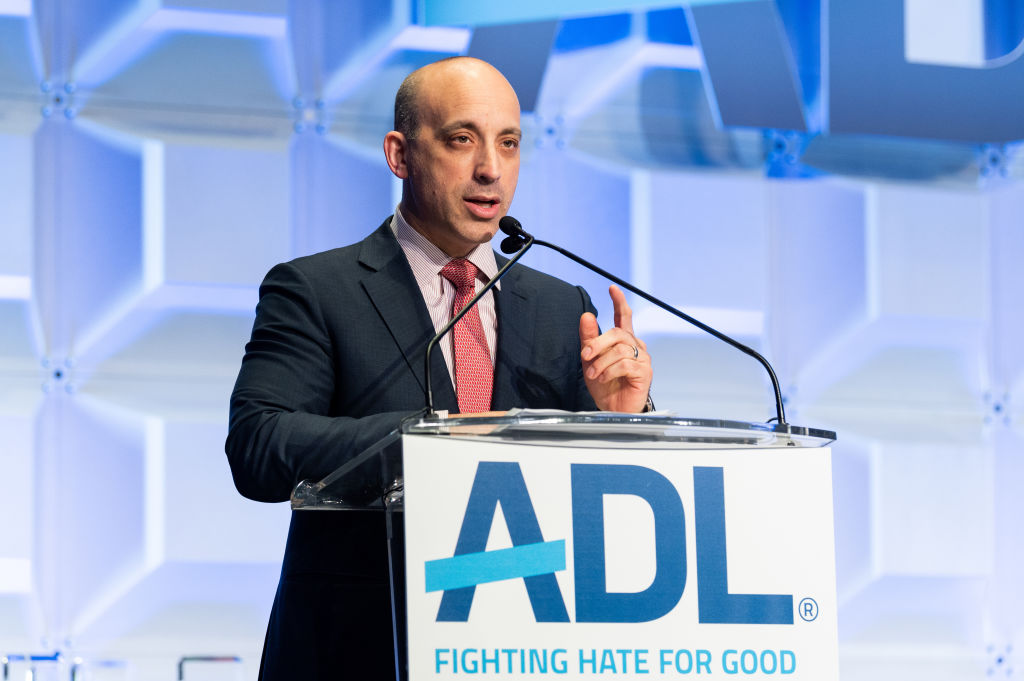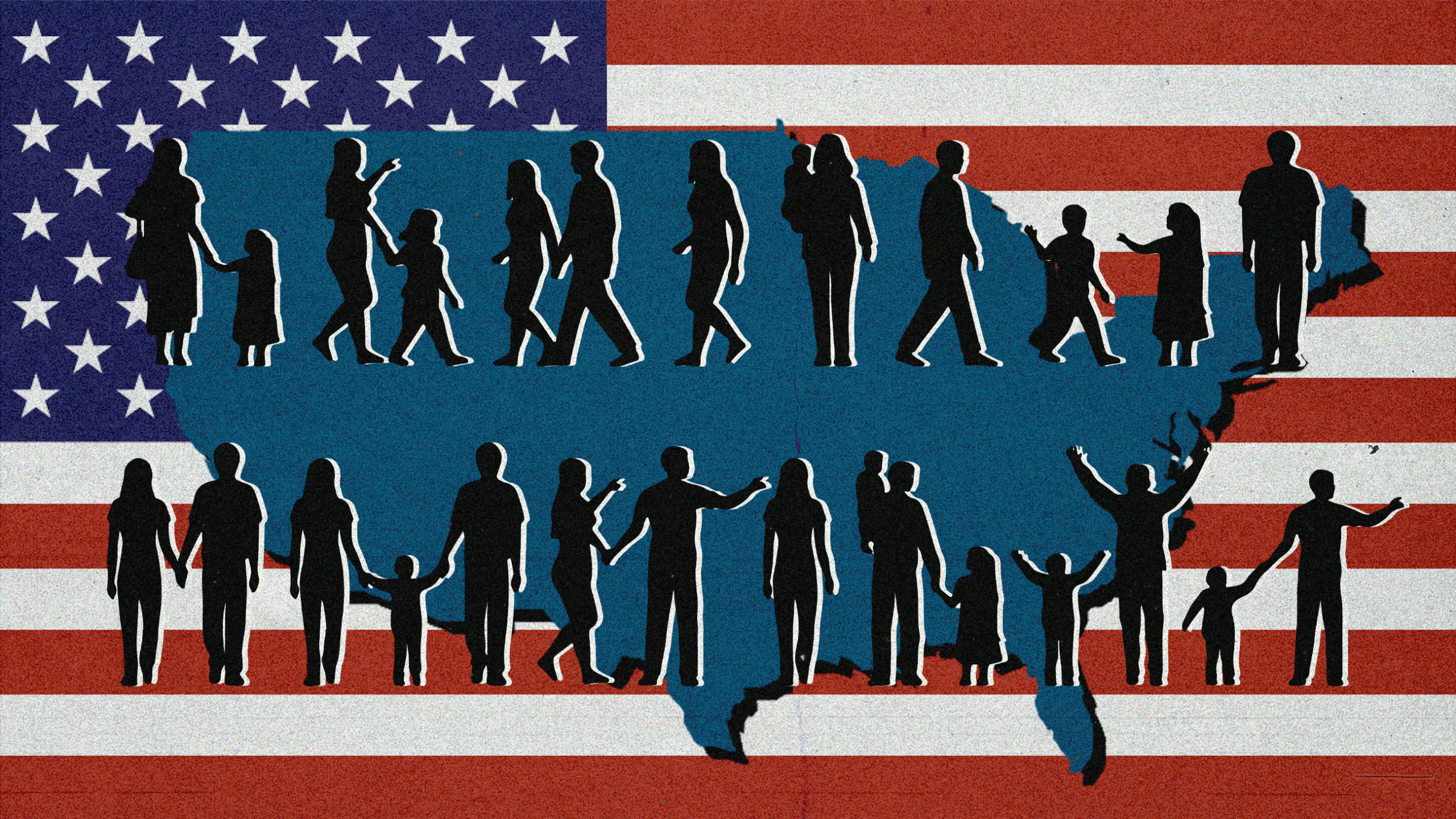First the Jews became whites; then the whites became Jews.
Forever on Edge

The Anti-Defamation League must confect a rising tide of antisemitic fervor or else go out of business.
The media’s alarmism over the “hate pandemic” that seems never to abate in white America has dominated conservative dialogue at least since the 2014 killing of Michael Brown in Ferguson, a significant moment in the history of our “racial reckoning.” But, of course, frustration with the legacy media over race and other related issues has been bubbling up for some time.
A useful data point validating these long-held frustrations over race-baiting sensationalism is the number of uncritical media citations of the Anti-Defamation League over the last few decades. Given the ADL’s certainly rocky history—replete, as it is, with criminal investigations, judicial condemnations, fabricated research, and bipartisan criticism—one wonders why major media outlets like CNN and the New York Times trust them at all.
Recently, the ADL released an annual report purporting to gauge the level of antisemitism in the U.S. As usual, journalists uncritically reported on its conclusions which found that antisemitism is high, rising, and should be of grave concern to the nation. The report found that nearly nine in ten survey respondents believe in at least one “anti-Jewish trope,” supposedly a big jump from 2019 when it was six in ten. Also, one-fifth of respondents believe in six or more such tropes, nearly doubling over the same period. Without any journalistic scrutiny, however, consumers of the coverage no doubt missed the tricks the ADL deploys in arriving at these seemingly surprising conclusions.
To statements like “Jews are more loyal to Israel than to America” or “Jews stick together more than other Americans,” survey respondents could answer “false,” “somewhat true,” or “mostly true.” (The “unsure/don’t know” was option was removed for this report, making it difficult to compare the survey to those of previous years.) Rather arbitrarily, the report also concludes that anyone who answers “somewhat true” or “mostly true” to 11 of the 14 statements is a “hardcore anti-Semite.”
All of this is significant, says ADL critic Ran HaCohen. Quoting survey expert John Krosnick, HaCohen argued that similar polling techniques used in a previous ADL report years back are designed to “incline…people toward accepting assertions, rather than thinking more extensively and seeing the flaws in those assertions.” To limit response choices and allow respondents to pick less certain and less meaningful answers (e.g., “somewhat” versus “mostly” true) curbs deep reflection and nudges otherwise unsure respondents in a specific direction.
There is also an in-built tendency toward higher results in the form of numerous survey statements being largely similar. For instance, if you answered “somewhat true” to “Jews have too much power in the business world,” you are likely to answer the same for “Jews have too much control and influence on Wall Street.” It is worth noting that around 20 percent of respondents answered at least “somewhat true” to the “too much power” statements. But if this is truly alarming, one should wonder about the level of unease if another racial group replaced “Jews” in these questions—namely Gentile whites, or perhaps East or South Asians.
Citing the Authoritarian Personality, an infamously un-empirical and ideologically-driven “study” written in 1950 by neo-Marxist Theodore Adorno, we’re told that any belief in these tropes can “lead to hostility and violence” against Jews. Does a “significant” part of the country believe in such potentially violent ideas? Yes, we’re told that 85% believe in at least one (that is, to at least one they answered “somewhat true.”)
The percentage who believe in each of the statements, however, is small, at just three percent. But if you extrapolate that to the rest of the country, the report tells us that it “corresponds to approximately 8 million people—more than the number of Jews in the United States.” (My emphasis.) Clearly, this framing is designed to induce terror and fear.
Despite such doom-laden conclusions about Jewish security in America, no survey experts or critics of the group (and there are plenty) were consulted in any of the coverage I could find. Moreover, reporters weren’t able to scrutinize the underlying data from the survey. The ADL actually handed off the public release of the data to the University of Michigan’s InterUniversity Consortium for Political and Social Research. But when I asked for it (twice), I got nowhere. It would be nice, for instance, to see how the ADL’s data breaks down by race and ethnicity. Or to confirm that removing “unsure” from the response options did not, in fact, affect things much (something the ADL’s press people told one outlet).
Anti-Semitism in the U.S.
That the ADL traffics in false narratives about a supposed antisemitic pandemic in America is not controversial. Critics—even from the Left—have long pilloried the problems in their research and, just like the Southern Poverty Law Center, even ADL-insiders have admitted they are intentionally alarmist.
In an interview about the ADL, Noam Chomsky said that antisemitism in the U.S. does not equate to a pandemic and “maybe comes up to a thousandth” in the ranking of national problems. The Village Voice’s David Klinghoffer once wrote that antisemitism is an “obsession” for the ADL. “In the American Jewish community, we’ve got anti-Semitism without anti-Semites, Klinghoffer averred. “Or almost without anti-Semites. In a country as big as American you are inevitably going to find nuts and cranks, haters and despisers, of every description—if you look hard enough.”
In fact, the ADL has a history of concocting hate hoaxes. It once created a phony New York City chapter of the Christian Patriot’s Defense League, an Illinois-based paramilitary group, ostensibly to “prove” that dangerous hate groups were on the rise. ADL members apparently were interviewed for a TV documentary in which they wore fake moustaches and costumes and spouted stereotypical “hateful” rhetoric. In another instance, ADL agent James Mitchel Rosenberg worked covertly to befriend figures in the KKK and even spoke at their rallies and other meetings with extremists. Another ADL spy, Roy Bullock, attended Holocaust-revisionist events and urged attendees to join Arab civil rights groups so he could out them as neo-Nazis.
As U.S. extremism expert Laird Wilcox has written in The Watchdogs, his masterful critique of “hate-watch” groups, the ADL has never copped to any of this. “I suspect there have been more cases like this,” he says. “This is but one more reason why journalists and others should be extremely wary of this organization.”
While these examples all took place in the eighties and nineties, current CEO Jonathan Goldblatt appears just as committed to stoking anxiety in the community the ADL purports to represent. Take, for instance, his statement in 2016 that the rise in antisemitism in the U.S. is just as alarming as it was in the 1930s—that is, the period leading up to the Holocaust. Or his relaying of uncorroborated reports to CNN about antisemites driving through Jewish neighborhoods in L.A. throwing bottles at houses with mezuzahs on their doors.
Why the ADL Does What It Does
As to why the ADL fearmongers, the reasons are no doubt manifold. Money could be a mitigating factor. In Beyond Chutzpah: On the Misuse of Anti-Semitism and the Abuse of History, Norman Finkelstein joked that were he not able to conjure up antisemitism, former ADL national director Abraham Foxman would have to find a “real job”—or one that pays the equivalent of his ADL salary at the time of $500,000 a year. Its “civil-rights work” has always simply been a con “for bilking gullible Northern liberals,” wrote one former staffer in the New Yorker.
But among the few critics who have seriously engaged with the question of why the ADL manufactures anxiety around antisemitism, its commitment to Israel is the most popular theory. Scaremongering American Jews, as well as Gentiles, about supposed antisemitic threats indirectly lends the Israeli state greater legitimacy, inoculates the country from criticism, and encourages aliyah, or the immigration of Jews from the diaspora to West Bank settlements and elsewhere.
It isn’t far-fetched. Chomsky has said that anti-semitism is “manufactured…very consciously” by the ADL and that “insinuations of anti-Semitism or direct accusations, are intended to deflect or undermine opposition to Israeli policies.” In fact, it’s also much of the premise of Yoav Shamir’s 2009 documentary Defamation. In making the film, Shamir was given unprecedented, months-long access to Foxman, documenting numerous eye-opening scenes, including the latter offering to provide the Ukrainian government with important U.S. contacts if they agreed not to publicly compare the Holodomor (Stalin’s manufactured starvation of millions) to the Holocaust.
Certainly the ADL’s commitment to the Jewish homeland could not be more fulsome, sometimes even eclipsing not just basic ethical standards but the law as well.
There’s the 1985 spy case of U.S. intelligence analyst Jonathan Pollard , who was sentenced to life in prison for sending a Top Secret information over many years to the Israeli Defense Force. Pollard’s handler was Avi Sella, an Israeli Air Force Colonel whose wife worked for the ADL as a lawyer at the time. The ADL ran legal- and PR-cover for Pollard, who stated that the organization was itself involved in spy operations.
Most alarmingly, the major player in the ADL’s spy operations, Roy Bullock, was found in possession of a floorplan for the offices of the American-Arab Anti-Discrimination Committee as well as a key belonging to the group’s executive director, Alexander Odeh. The materials were found after the group’s offices were bombed and Odeh was killed. Although members of the terrorist organization the Jewish Defense League were later convicted for the killing, this fact is deeply troubling.
Israel Probably Doesn’t Need the Help
Writing in The New Republic in the nineties, J.J. Goldberg summed up the expansion of the charge of “anti-Semitism” well when he wrote: “Before World War II, anti-Semitism was defined as wanting to harm Jews. In the post-war era, it was broadened to include prejudice that might lead one to wish Jews harm. More recently, it’s come to mean any stereotype—or disagreement—with the Jewish community.” Today, thanks to the ADL, Goldberg’s list would surely include unfairly criticizing Israeli policy as well.
Expanding the definition of antisemitism so that Israel becomes akin to a “Jew among nations” was first conjured up by the ADL in the 1970s with the publication of then-CEO Arnold Forster’s book, The New Antisemitism. The decades-long campaign has certainly been a success, having been incorporated into the official definitions of antisemitism of the U.S. State Department as well as the Canadian government.
But how traceable this and other forms of the ADL’s advocacy has been to Israel’s success today is far from clear.
In fact, on the 75th anniversary of its founding, Israel’s doing just fine. Today the country has a higher life-expectancy than the U.S.; a higher GDP per capita than Italy, Japan, and Spain; and its most hostile neighbors over the years have either been neutered or placated, losing its mantle perhaps of being that lone “outpost of civilization against barbarism,” as Theodor Herzl once said.
Israel also faces no crisis in group identity or collective self-confidence. In fact, it’s probably unmatched in these departments vis-a-vis any other Western nation today. Such self-assuredness goes back generations and is basically inscribed in the nation’s DNA. Consider that Israel is the only developed nation in the world with a replacement-level birthrate, and that the Jewish birthrate is higher than the Israeli Arab rate.
Growing up in a creedal, hyper-individualistic nation like the U.S.—and at a time when most liberal elites eschew civic patriotism—it’s possible some of the ADL’s American supporters fail to understand or appreciate Israel’s fundamentally ethnocratic and sui generis character. Unlike the U.S., as well as other Western nations, Israel was founded and is maintained as a state embodying an explicit majoritarian Jewish identity. “Israel is different from other countries,” said Chief Justice Aharon Barak. “It is not only a democratic State, but also a Jewish State.” Its quasi-constitutional Basic Law, along with other fundamental laws, ensures that American-style individual rights and creedal values, while present, always take a back seat when it comes to public policy formation and national guidance generally. Interior Minister Eli Yishai once said vis-a-vis Israel’s immigration policy: “In having to choose between being called ‘enlightened and liberal’ but not having a Jewish and Zionist state, and being called ‘endarkened and racist’ but being a proud citizen, I choose the second option. The era of slogans has ended….”
Say what you will about such sentiment, but Jewish identity is etched into Israel’s legal and foundational fabric, a fact clearly recognized by its ultra-confident national leaders. Help from groups like the ADL simply is not needed.
Constructed Crisis-Bonding
Perhaps it is arguable that the ADL’s astroturfed ploys have produced a kind of group solidarity among Jews. In Shamir’s Defamation, ADL members admit this, telling the director that “lacking a common religion, anti-Semitism is now used to bond, and form the identity of, the secular Jewish community.” And as HaCohen sees it, in the ADL’s mind, “anti-Semitism should always be on the rise, to boost our national cohesion.”
Maybe the ADL’s performative crisis-mongering does give some American Jews a greater feeling of solidarity; that is, among themselves, their fellow co-ethnics in the greater diaspora, and with Israel itself.
But is this the kind of solidarity Jews want or need? That is, a solidarity resting on a foundation of suspicion and delusion that fosters a siege-like mentality? It is not speculative that decades of the ADL’s incessant fearmongering have had the effect of neuroticizing many within the Jewish community. J.J. Goldberg writes, “some Jewish agency staffers insist the alarmist tone set by a few national Jewish agencies…is a key cause of Jewish anxiety…. Fingers point most often at the ADL.” And as Rabbi Hecht puts it in Defamation: “Clearly, the ADL has been responsible in certain areas to flare up things as much as they’ve helped.”
So if solidarity’s a benefit, what are the disbenefits? Are American Jews afflicted with greater anxiety, perhaps to the point of being irrationally suspicious of their Gentile neighbors? Are Jews hunkering down and dropping out of American civic life? How many have made aliyah to the relatively hard life in the West Bank settlements based on these worries only to end up regretting it?
If the ADL’s campaigns are essential to ethno-cultural solidarity, what you have is essentially a Ponzi scheme—one that requires ever more antisemitic inflation, hate hoaxes, fake research, and phony outrage. In the face of improved Jewish-Gentile and race relations more generally, the ADL will have to become increasingly deranged to keep up its relevance, political clout, and profitability.
Positive Solidarity?
The ADL commands an 800-person staff and an annual budget of $70 million. To ensure Jews don’t stray from the herd, it can and should spend its resources on better, more positive things than feigned histrionics and out-group antagonism. Certainly, there are enough points of pride among Jews for the ADL to foster an equally strong and far healthier form of in-group cohesion. After all, the Jews brought an ancient language into the modern world, turning it into their nation’s mother tongue in a single generation—revitalizing a biblical language with no words for car, plastic, transistor, etc. can’t be easy.
Diverse, multicultural societies are low trust societies. Within them, intergroup conflict is inevitable, so it’s paramount that powerful elites like Goldblatt foster conciliation between competing groups rather than suspicion. This means all out-group criticisms, and certainly accusations of out-group predation, must be done with the utmost sensitivity, reflection, care, and precision (if they need be done at all). Looking at the ADL’s past and current behavior, however, it’s unlikely this will happen soon, if ever.
To the extent the ADL engages in pseudo-research and pseudo-terror, it is a pseudo-advocacy group and a scam perpetrated on both the Jewish community as well as the country as a whole. They exist in the public sphere solely because the media fails in its job in reporting real, meaningful news and in holding the power centers of the country accountable. Unless, you are a member of the pseudo-media, the ADL does not deserve a moment of your attention.
The American Mind presents a range of perspectives. Views are writers’ own and do not necessarily represent those of The Claremont Institute.
The American Mind is a publication of the Claremont Institute, a non-profit 501(c)(3) organization, dedicated to restoring the principles of the American Founding to their rightful, preeminent authority in our national life. Interested in supporting our work? Gifts to the Claremont Institute are tax-deductible.
Whom does perpetual immigration serve?
Assailed from two sides, American Jewry is having an acute crisis of identity.



